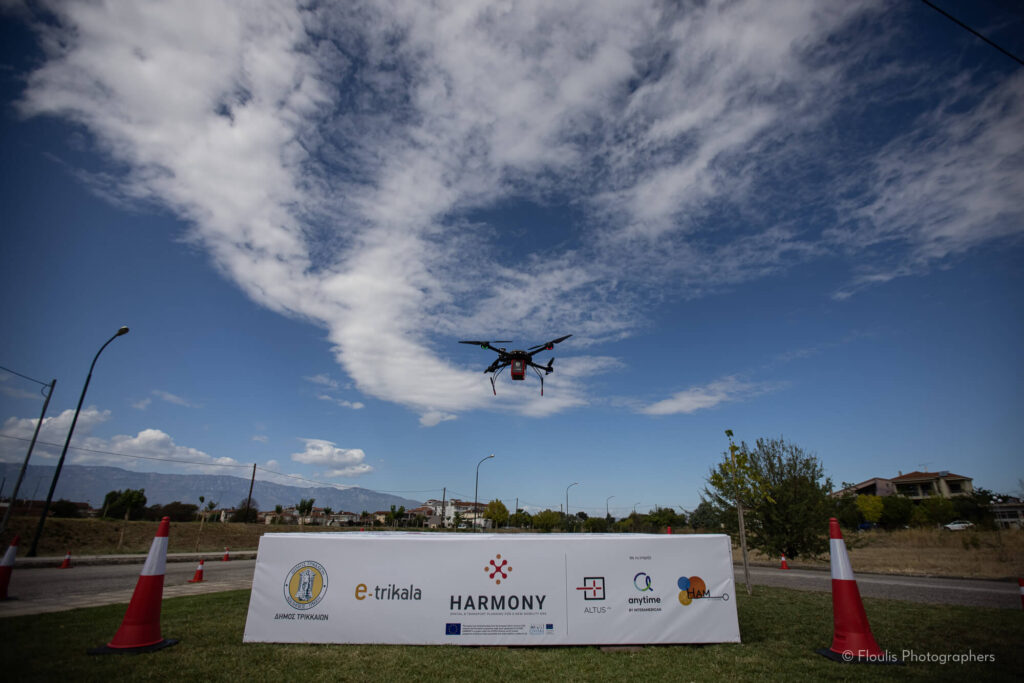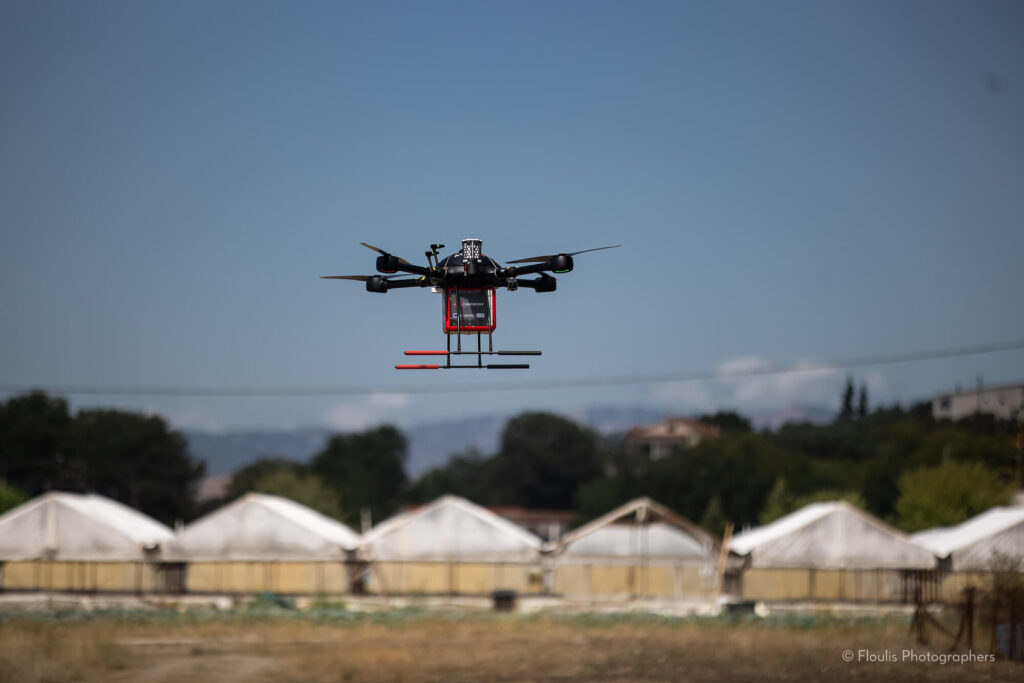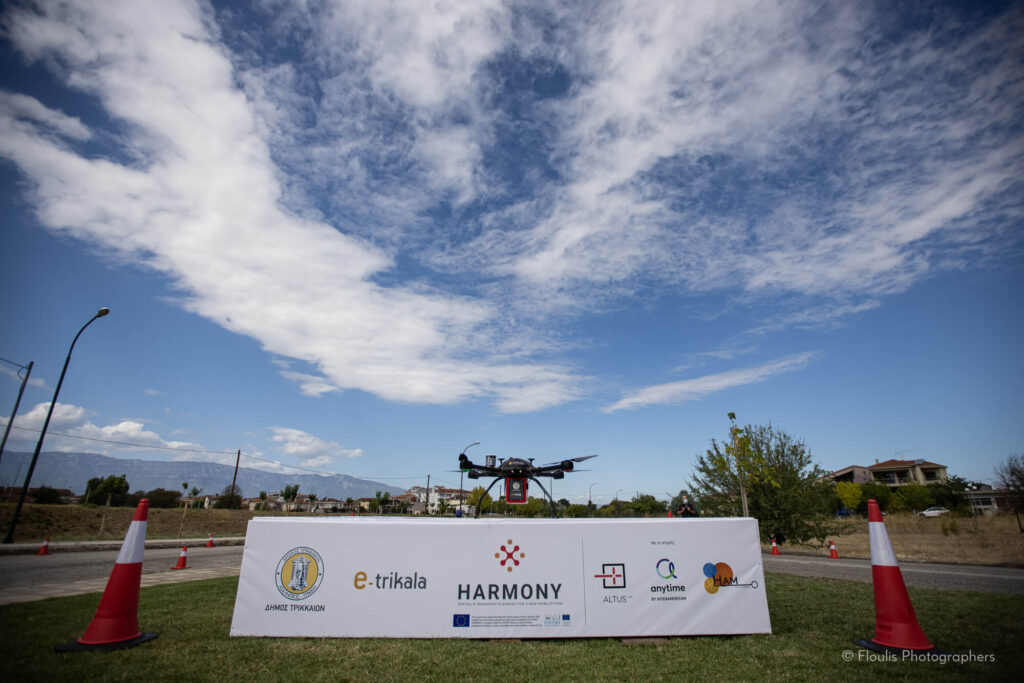The drone, which was developed for this project, crossed 3 km in Trikala, a northwestern city of Thessaly, to deliver medicines
The first test flight of transporting drugs to isolated areas in an environmentally friendly way by using a drone took place in Greece, a few weeks ago. The flight, part of the Harmony program promoted by the EU, took place in Trikala.
The drone flew 3 kilometers to deliver emergency medicines, and made two stops, landing outside a local pharmacy and in a farmer’s field. The flight aimed to gather conclusions and identify problems so that in the future the program can be implemented in real conditions.
The Atlas, the drone used, is made by the Greek company Altus and has a battery life of about 45 minutes. It has a temperature and humidity control system and was developed especially for the implementation of the program.
4i-mag interviewed both the Mayor of Trikala, Dimitris Papastergiou, and Dr. Elena Patatouka, from the company e-Trikala SA that participates in the implementation of the program.
“Technology can help vulnerable population groups”
The Mayor of Trikala describes the pilot program as innovative and promising and underlines that drones could be used and in cases of natural disasters, for the transport of both medicines and food. He is optimistic about the continuation of the program and the conclusions that will be drawn at the European level from similar tests in other areas.
The first European flight for the delivery of drugs by drones took place in Trikala. How did this project start?
“Municipality of Trikala is the first Smart City in Greece. We are trying to be innovative, not just for testing innovative projects. But our goal is to offer better conditions in everyday life for the citizens. Trikala wants to be a sustainable city; therefore, we welcome every project, program or idea, that helps the administration and citizens to improve living in the city. From 2015 and the first Driverless Bus in the world, up till now, we have tested a lot of European projects about e-health, e-government, or applications about providing better services to people, such as parking System for People with Disabilities, apps for complaints, and requests, environmental measurements, etc.
So, the first European flight for the delivery of drugs by UAVs in Trikala is another program that helps all the participants to infer conclusions that would be useful for people.

Courtesy of Municipality of Trikala 
Courtesy of Municipality of Trikala 
Courtesy of Municipality of Trikala 
Courtesy of Municipality of Trikala 
Courtesy of Municipality of Trikala
This program is part of the pilot demonstration of the ‘Harmony’ EU-funded project. HARMONY is a Research and Innovation Action project funded by the European Commission within the Horizon 2020 program. Harmony stands for “Holistic Approach for Providing Spatial & Transport Planning Tools and Evidence to Metropolitan and Regional Authorities to Lead a Sustainable Transition to a New Mobility Era”. Its consortium gathers 21 members from 9 different European countries that will be working together, among which 6 different cities and metropolitan areas, namely Rotterdam – NL, Oxfordshire – UK, Athens – GR, Turin – IT, Trikala – GR, Katowice – POL. Trikala is also a leading member of the UAM Initiative Cities Community (UIC2) of the EU’s Smart Cities Marketplace aiming to advance the sustainable and responsible implementation of urban air mobility. It will be an honor for the city of Trikala to receive support to further develop the business case and bring the project towards implementation. In addition, the pilot in Trikala has been part of the European Investment Advisory Hub, initiated by the European Investment Bank (EIB) and the EC, having received support for the development of the business case, which would bring the project towards implementation and integrate the sustainable automated, air mobility in the current ecosystem.
The pilot consists of a drone delivery service for medicines from the city center to the pharmacies in the rural areas in the regional area of Trikala in Greece. The drones will transfer medicines serving primarily the urgent needs of the elder population and vulnerable social groups with limited accessibility. Technology can help vulnerable population groups living in remote areas and can also help us achieve net-zero emissions. This pilot will improve the everyday life of citizens, decrease the delivery time (since no traffic congestion is confronted in the third dimension), reduce operational costs, and operate in a safer way promoting social distancing if needed, like in the context of the COVID-19 lockdowns. Not to mention the technological benefits of testing and deploying new urban air mobility technologies”.
The project is in the pilot stage. What are the first conclusions you drew from the flight?
“The flight has shown that pioneer clean technologies plus working together with the community can unveil new opportunities for all. Several authorities have worked together to provide approvals and permits. Opinions, requirements, and experiences of citizens and involved actors are in the process of being collected to co-create this service. Going to the third dimension, even for the first flights, is a collaborative project and the first signs of the pilot are that it revolutionizes the mobility ecosystem by enabling new jobs, tests, and investments in the local ecosystems in Greece and at a European level.
The first flights have shown that multiple positive disruptive impacts could be met and an alternative sustainable model for urban freight transport could be offered. Early evidence has indicated that lightweight drone platforms can deliver both economic and environmental efficiencies in the short-range distribution of small goods and can support several valid use cases in critical and emergency services. The project HARMONY aims to validate and meet the technical and governance challenges, to ensure that urban air mobility systems and services can be sustainably integrated with surface mobility modes and urban infrastructure”.
Do you think that a project like this could be extended to other areas? Like transporting food or necessities? Possibly in cases of natural disasters.
“Last year in a nearby Trikala area, floods and storms destroyed fields, houses, stores. A woman died, people in the mountainous villages were unable to receive their medicine. Yes, micro-transportation is a solution for extraordinary situations, difficult weather conditions, for natural disasters to reach where no one else can. Besides, the first drone in Trikala carried adrenaline and medicine for special cases.
That’s why with the Harmony program we are studying ways to be useful. I believe that soon EU will find solutions and open ways to help people in difficulties”.
Every innovation is accompanied by «concerns» of citizens who believe that jobs will be lost and that “robots will gradually replace us”. Do you think we should be afraid of technology?
“Here in Trikala, we faced some reactions from quite few people about the Driverless Bus. They were sending their complaints with an e-mail. So, the answer was simple; with this e-mail, you have just fired a mailman
You see, technology is always a step ahead, is always a better way to improve our lives. How many farriers are there today? How many tinsmiths? And how many programmers in computer languages are “moving” the hands of a doctor during a remote surgery? How many experts are in recycling?

Courtesy of Municipality of Trikala 
Courtesy of Municipality of Trikala 
Courtesy of Municipality of Trikala 
Courtesy of Municipality of Trikala
Neo-Luddism is the opposite of innovation, of a new way of life. Of course, innovation and technology aren’t just a better way of having all of the apps and social media on our mobile phones. This is just the result of hours and hours that people spend to find solutions.
Nowadays the most important is to face unemployment in the EU, to create new paths for new jobs, to must believe in educating people, to find a way to progress. A part of this progress is the Harmony program in Trikala”.
“The first step into building a robust alternative for delivery of medicine“
Dr. Elena Patatouka describes the technical specifications followed for the implementation of the project and the first conclusions drawn from the test flight. She also explains how the information collected during the pilot phase could be used to extend the program in the future.
From the first pilot flight, what conclusions have you drawn? Are there any signs that bother you or something that you found to need improvement?
“The first flight was the first test for most of the technological aspects of the pilot. The first one was the behavior of the drone, which provided positive results, but depending on the distance and the line of sight may need to adapt the way it provides the medicine, either by landing or by other ways of lowering them down to the pharmacist. Various technologies exist to tackle such issues, so we have to adopt the most appropriate and suitable ones for our specific pilot. The service is of course very innovative and well-accepted, and this first flight was the first step into building a robust alternative for delivery of medicine (and in the future even other goods maybe) in Trikala”.
When do you estimate that the project will go through the pilot phase to become part of the daily life of citizens?
“The project addresses the challenges of transferring medicine to elder citizens and vulnerable social groups with limited accessibility through a safer, greener, smarter, cheaper, and faster solution that will replace the traditional freight mobility regime. The pilot will be demonstrated for 2 months in the context of the EU-funded project HARMONY. Beyond the technological goals and benefits to test and deploy novel urban air mobility technologies, as well as the environmental benefits of replacing fossil fuel vehicles with green ones and reducing congestion, the primary benefits are social. The principal aim is the improvement of the everyday life of citizens that have limited accessibility due to age, personal situation, or lack of public transport in rural areas during specific periods of the day (i.e. night-time etc). An effort will be made on advancing the well-being of this segment of the population through time savings and effective transfer of medicines. In case the pilot is well accepted and solves urgent needs of the citizens, it will be discussed how the pilot could be transformed to a permanent service”.
A very specific drone is used for the transport of drugs, with special features. Do you think that a different type of drone would be needed to extend such a project to other areas, such as transporting food and necessities?
“It is considered by the project team that the crisis outbreaks have accelerated the need for within-day accessibility to urgent medication through a remote process. This challenge poses new requirements, given that medicine deliveries are demanding. The medical requirements are provided by the medical community and will be cross-checked by the Civil Aviation Authority in Greece so that the medicine will be delivered safely by a drone as conducted by the current traditional means, but through a faster and better-managed process from the city center to the rural settings. A series of safety requirements (e.g. maximum weight of the drone, flight duration) and must-have technical specifications (e.g. weather condition dependence) are defined for the drones. In case the areas or goods are differentiated, different technical requirements should be met as well as an alternative business model”.



